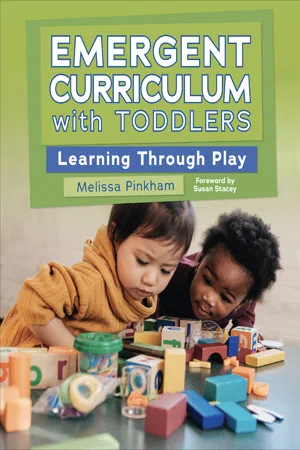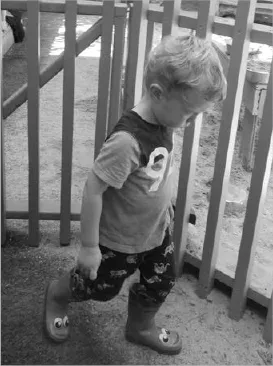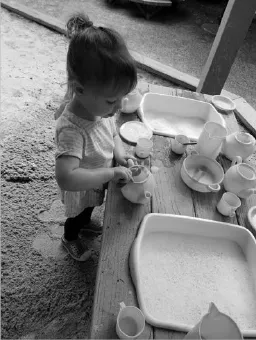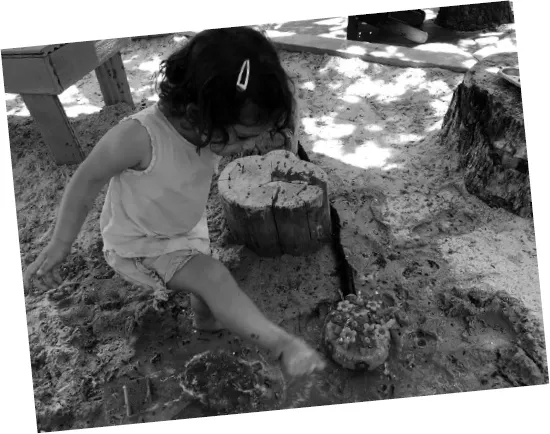
- English
- ePUB (mobile friendly)
- Available on iOS & Android
eBook - ePub
About this book
Emergent Curriculum with Toddlers addresses and defines the practice of emergent curriculum and its specialization and integration into toddler programs. Toddlers are at a unique and important stage of development, so educators require resources that are specifically written for this crucial time of life. An emergent curriculum for a toddler class can look quite different from a preschool class in terms of the children's developing themes, the teacher's observational skills, and the emotional and social climate in the program.?
Frequently asked questions
Yes, you can cancel anytime from the Subscription tab in your account settings on the Perlego website. Your subscription will stay active until the end of your current billing period. Learn how to cancel your subscription.
No, books cannot be downloaded as external files, such as PDFs, for use outside of Perlego. However, you can download books within the Perlego app for offline reading on mobile or tablet. Learn more here.
Perlego offers two plans: Essential and Complete
- Essential is ideal for learners and professionals who enjoy exploring a wide range of subjects. Access the Essential Library with 800,000+ trusted titles and best-sellers across business, personal growth, and the humanities. Includes unlimited reading time and Standard Read Aloud voice.
- Complete: Perfect for advanced learners and researchers needing full, unrestricted access. Unlock 1.4M+ books across hundreds of subjects, including academic and specialized titles. The Complete Plan also includes advanced features like Premium Read Aloud and Research Assistant.
We are an online textbook subscription service, where you can get access to an entire online library for less than the price of a single book per month. With over 1 million books across 1000+ topics, we’ve got you covered! Learn more here.
Look out for the read-aloud symbol on your next book to see if you can listen to it. The read-aloud tool reads text aloud for you, highlighting the text as it is being read. You can pause it, speed it up and slow it down. Learn more here.
Yes! You can use the Perlego app on both iOS or Android devices to read anytime, anywhere — even offline. Perfect for commutes or when you’re on the go.
Please note we cannot support devices running on iOS 13 and Android 7 or earlier. Learn more about using the app.
Please note we cannot support devices running on iOS 13 and Android 7 or earlier. Learn more about using the app.
Yes, you can access Emergent Curriculum with Toddlers by Melissa Pinkham in PDF and/or ePUB format, as well as other popular books in Education & Early Childhood Education. We have over one million books available in our catalogue for you to explore.
Information
1
Being Curious: What Is Emergent Curriculum?
How often have you heard teachers of toddlers say, “I want to try emergent curriculum with my toddler class, but I don’t know where to start?” or “How do we teach toddlers without a thematic, scripted curriculum?” Some ask, “How can I implement a curriculum in a program that has so many daily caregiving responsibilities?” “What is the teacher’s role in emergent curriculum?” or “How do we evaluate the progress and development of toddlers?”
These are common concerns when tackling the momentous task of educating toddlers, especially under the pressure of directors, families, school agencies, and the community at large. Toddlers are fast, impulsive, irrational, and emotionally vulnerable. This can make the idea of implementing emergent curriculum feel overwhelming. Predetermined themes in a toddler program may appear to be more manageable as teachers follow a developed curriculum and implement the topics into their programs. However, an abundance of research shows that when teachers focus on supporting the immediate development of the child, especially in the toddler years, this cultivates a love of learning. Toddlers are very present and active, and they have the potential to be fully engaged in the learning process. When teachers plan topics that are unrelated to the immediate interests of toddlers and try to stay rigid to the theme, there is potential to create power struggles, decrease the opportunity for autonomy, and take away opportunities to promote curious minds.
Let’s use the example of a thematic curriculum and the children’s responses that I recently observed in a toddler program located in the beach community of Aptos, California. The teachers announced to the children that the theme of the week was “deserts.” Cactus cutouts were placed on the table for the children to paint, the teachers sang a song about deserts at circle time, and pictures of desert animals were placed out on a low board for children to view. The toddlers in this particular group seemed more focused on their own ideas: playing with babies in the dramatic play area, digging large holes in the sand, and painting different surfaces using brushes and water. The toddlers had many inquiries in their own play: What does it mean to take care of a baby? How deep can I dig? What is under the sand? When we paint with water, why does it change the surface’s color and then the water disappears? However, the teachers insisted that the toddlers paint what they had made available inside, wanted the toddlers to pretend they were animals in the desert instead of playing with baby dolls, and taught about the animals in desert climates instead of investigating holes with the children.
In this case, the scripted curriculum took the natural sense of inquiry out of learning with children. As often happens in toddler programs, the teachers got locked into a theme versus listening to the toddlers’ inquiries. Was the theme of deserts connected to the toddlers’ world? Was it really necessary to teach toddlers about deserts, especially considering their own community was coastal land? Were the teachers responsive to the toddlers’ interests? From my observations that day, it was clear that the teachers were more concerned about their own teaching of the theme than the interests the toddlers were demonstrating through their play. When curriculum is relevant and contextual and speaks to the emotional and social complexities toddlers experience on a daily basis, teachers will find engaged learners, fewer power struggles, and an environment that is responsive and supportive to all.
Let us begin to take a look at the practice of emergent curriculum, the reasons it benefits this sensitive stage of a child’s life, and why teachers’ observational skills are essential to effective and meaningful curriculum.
Emergent curriculum is a method of planning wherein many of the ideas evolve from toddlers’ interests and questions. Toddlers have many inquiries about the world they live in and bring these questions to their environments. For many children, toddler programs become the first place where they can investigate their ideas.
What Is Emergent Curriculum?
Emergent curriculum is co-constructed by both children and adults. This means that teachers and children have a partnership in the learning process. Teachers play a role in creating an environment that provides the toddlers with materials to support their thinking. Toddlers bring their inquiries and questions to the teachers, which in turn support the teachers’ curriculum planning. Through observation, reflection, interpretation, and planning, teachers gain an understanding of the children’s curiosities and can thoughtfully plan a curriculum that supports all of the areas of a toddler’s development.
When teachers begin practicing emergent curriculum with toddlers, the first task is learning how to observe the children’s interactions with the environment and the people in it. Many teachers view observation as a way of just watching what children do. Instead, imagine observation as a way of listening to the children to develop an understanding of what they are thinking. Observation begins with active listening, which leads to reflection and interpretation. (See chapter 3 for more about observation.)
One basic requirement of emergent curriculum is understanding the value of play in toddlers’ learning. This calls for teachers to trust the essential role of play in a child’s development, as Elizabeth Jones and John Nimmo urged decades ago in their foundational book, Emergent Curriculum. Play allows toddlers plenty of active participation with their environment as well as the opportunity to investigate their ideas. When toddlers play, they make sense of their questions through the physical environment. Through play, toddlers interact with objects, often with repetition, to develop an understanding of how things work. They use open-ended materials such as sand, dirt, blocks, and water to find a deeper meaning to their questions.
In play with the people in their environment, toddlers learn about interpersonal relationships and begin the process of understanding the art of socialization. In addition, toddlers learn through their physical bodies by climbing, jumping, pushing, running, and other large-motor activities (Maguire-Fong 2015). Play is a necessary component of emergent curriculum because it is self-initiated and allows children to be actively engaged and to take charge of their own learning.
Honoring Toddlers’ Unique Development
During the first three years of life, a tremendous amount of growth occurs in a child’s brain. Children from ages birth to three experience extensive changes in every area of their development. This includes social and emotional growth, motor skills, language, and cognitive growth. This sensitive stage of development gives teachers the opportunity to create a curriculum that focuses on the specific needs of a toddler (Hyson and Tomlinson 2014).
Toddlers experience emotions intensely and are acutely aware of their environment. A toddler’s developmental undertaking is to understand what they are feeling, develop ways to regulate their emotional impulses, and find healthy outlets for self-expression. They also become interested in relationships and begin to build trust with others and their environment. Teachers of toddlers must serve as social and emotional coaches.
When teachers implement emergent practices, toddlers’ sensitive needs are addressed through the curriculum. Teachers can recognize and nurture these huge milestones by integrating strategies and tools that are emotionally supportive to toddlers’ development as they work through this stage. Let’s look at some of the reasons emergent curriculum is essential to toddler development.
Separation Anxiety: Saying Goodbye
In the example presented, the toddler teacher incorporates the separation process as an important area in the curriculum. How can teachers support the toddlers in building trust in the school environment? What types of strategies can they follow to foster trusting relationships with teachers? (Separation anxiety is discussed in more depth in chapter 5.)
Two-year-old Miles has just separated from his mother and is working through separation anxiety. His teacher, Patty, recognizes his emotional vulnerability and the need to connect with his teachers and the program. Since separation is an essential developmental task for toddlers, the teachers discuss and develop ways to implement supportive strategies through curriculum. Patty stays close and provides Miles an object from home, a family photo. This allows him to stay connected and work through his separation in healthy ways.


Developing Autonomy: “I Can Do It!”
Another important phase in toddler development is the process of navigating their budding sense of autonomy. Toddlers are transitioning through the stage of dependence to independence. Since emergent curriculum acknowledges and takes into consideration their developmental stages, this growing autonomy is addressed within the daily practice. This minimizes the excesses of power struggles that are inherent in toddler programs, since the curriculum provides the toddlers with opportunity to experience independence in responsive and respectful ways.
Two-year-old Fiona is very interested in the small sink that is used for hand washing inside. Ana, her teacher, observes Fiona’s fascination with bubbles and sponges. Since the sink inside has a specific purpose, Ana redirects Fiona outside to the water table and adds a liquid soap with sponges and dishes for Fiona to explore. Ana is responsive to Fiona’s curiosity and need for autonomy, while at the same time teaches respectful boundaries about the environment.

Two-year-old Fiona is redirected to the water table for dishwashing.

Toddler playing in water and sand
Brain Growth: A Sensitive Period for the Development of the Brain
A toddler’s brain produces more than a million neural connections each second and undergoes incredible changes in the early years. This development is influenced by many factors in a child’s environment, including their interactions with adults. The relationships toddlers have with their teachers, peers, and caregivers are vital for healthy brain growth (Jensen 2000). Curriculum plays a major role in this phase of neural development, and emergent curriculum is sensitive to and respectful of this critical stage. When teachers use rigid themes that are irrelevant to these areas of development, they are missing opportunities to influence and strengthen the brain.
Just recently I observed a toddler program where the teachers were introducing a theme of apples during the fall season. The toddlers, however, appeared more interested in the community garden located on the school grounds. After visiting the garden, the toddlers asked questions about the mint herb they tasted. The children were also intrigued by the cherry tomatoes, zucchini, and squash they harvested when visiting the garden. The toddlers were excited about the garden and wanted to discover everything they could. The teachers, although impressed with the toddlers’ inquiries, felt the need to stick to the theme of apples. At one point during the day, the teachers were even discouraging the children’s request to visit the garden and instead tried to engage the toddlers in an apple-tasting activity. The toddlers became frustrated with the activity and refused to participate.
Relationship building between teacher, caregiver, and child is an important contributor to healthy brain growth in the early years, but the teachers lost an opportunity to build a relationship through learning because of the rigid adherence to the theme. What would have happened if the teachers had listened to the toddlers and allowed them to pursue their inquiries in the garden? Imagine if the teachers brought fruits and vegetables from the garden for a tasting activity. Toddlers learn by being physically engaged with the materials and people in their environment, and these components create the strongest neural connections in the brain (Zero to Three 2006).
Developing Learning Dispositions with Toddlers
The most effective and meaningful learnin...
Table of contents
- Cover
- Title Page
- Copyright
- Dedication
- Contents
- Foreword: Emergent Curriculum for Toddlers
- Acknowledgments
- Introduction: My Journey with Toddlers
- Chapter 1: Being Curious: What Is Emergent Curriculum?
- Chapter 2: The Teacher’s Role in Emergent Curriculum
- Chapter 3: The Sources of Emergent Curriculum: Observing the Children
- Chapter 4: The Sources of Emergent Curriculum: Teachers
- Chapter 5: The Sources of Emergent Curriculum: Developmental Tasks
- Chapter 6: The Sources of Emergent Curriculum: Routines and Serendipity
- Chapter 7: Putting It All Together
- Chapter 8: Documentation: Making the Learning Visible
- Appendix A: Using Emergent Curriculum Sources for Planning
- References
- Index